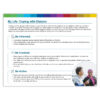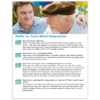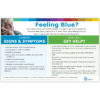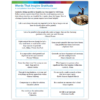
Coping with Kidney Disease
Whether patients are just starting dialysis, returning after a transplant, or have been on dialysis for years, coping with the changes it brings to daily life can be hard. The emotional effects of kidney disease can affect both patients and their families. It is normal to feel stressed or even scared about these changes. Coping effectively is important for patients. This page was created to help guide patients to effective tools and resources to improve coping skills and live well, even on dialysis.
Patient Tools and Resources

Download: My Life – Coping with Dialysis

Download: Myths vs. Facts About Depression

Download: Feeling Blue Poster – English

Download: Words That Inspire Gratitude

Download: Kidney Mandala – How Can Coloring Help Me?

Download: Train Your Brain to Relax
-
My Kidney Kit – online patient resource tool
- My Life: Being Active
- My Life: Coping with Dialysis
- My Life: Healthy Lifestyle Choices
- My Life: Traveling with Dialysis
- My Treatment: Depression
- Exercise to Feel Better crossword puzzle (patient handout)
- Self-Reflection Journal (patient handout)
- Stress Awareness: Learning to Relax (patient handout)
- Train Your Brain to Relax (patient handout)
- What You Can do for Depression (patient handout)
- Topic of the Month: Coping and Depression
ESRD COVID eNewsletters:
April 20 | March 20 | May 11 | May 25 | June 8 | June 22 | July 14
Credible Resources for Coping and Depression
- Owning Your Feeling tips for success sheet provides understanding and validation of how you may be feeling, along with a What’s Underneath worksheet to help process those feelings. You can download here.
- American Heart Association website (heart.org) has tips for healthy living including mental health and stress management.
- Coping with Kidney Disease- Module 5. Kidney School is an online program offering a course with information on emotions, asking for help and recognizing and dealing with depression. Kidney School is a program of the Medical Education Institute, Inc. (Printed version)
- Dialysis Patient Depression Toolkit. This toolkit was designed by patients and for patients, in collaboration with healthcare experts, to help individuals who feel they may be experiencing depression, by the National Forum of ESRD Networks. (English/Spanish)
- Exercise: A Guide for People on Dialysis. This Life Options booklet and companion DVD: Feeling Better with Exercise for people on dialysis are available at lifeoptions.org/.
- Just the Facts: Dealing with Depression. This Life Options handout provides information and guidance on dealing with depression and managing one’s mental health.
- Living Well on Dialysis- Take Charge of your Emotions is a patient handout available in English and Spanish created by from the American Psychological Association and Dialysis Patient Citizen.
- Understanding Depression in Kidney Disease. This American Association of Kidney Patients booklet gives readers an understanding of what depression is, what may cause it and how it is treated.
- National Kidney Foundation Coping Effectively: A Guide for Patients and their Families https://www.kidney.org/atoz/coping-effectively-guide-patients-and-their-families
Resources to Help Cope with COVID-19
- Centers for Disease Control and Prevention resources on stress and coping with COVID-19
- APA COVID-19 Information and Resources.American Psychological Association (www.apa.org) has updates their website for health-care workers and the public.
- Coronavirus Anxiety Workbook. The Wellness Society offers toolkits to therapists and individuals, including this workbook to be used as a tool help build resilience during difficult times.
- Coronavirus Disease 2019 (COVID-19) information is available on the Centers for Disease Control and Prevention (CDC website cdc.gov)
- Stress and Coping
- Keeping Patients on Dialysis Safe
- Dialysis Patient Citizen’s Education Center Resource Listing for additional support during COVID-19 Factsheet. Resource topics include: disability, financial assistance, nutrition, healthcare, housing and utilities, jobs, transportation, women and children, daily living, and staying safe.
